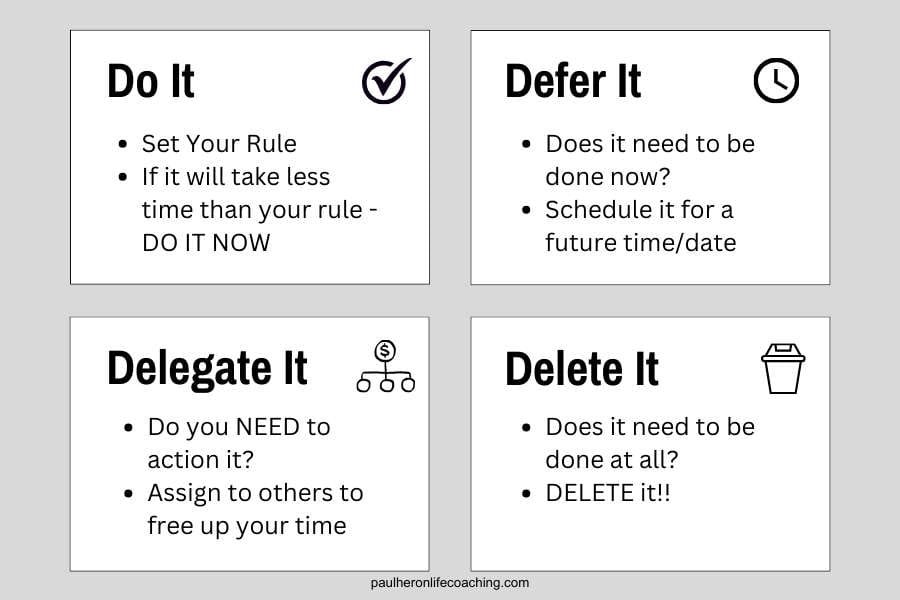Why Time Management is More Than Just a To-Do List
I remember reading David Allen’s Getting Things Done a few years back and being impressed by one of his simple rules: complete tasks under two minutes immediately.
This principle drastically reduced the size of my inbox and was the first step that led me to a concept called the 4 Ds of time management.

Effective time management is about more than just over coming procrastination and completing our checklists.
It requires building reliable, repeatable systems, and if this area of your business is suffering, then this continuous improvement framework might just be exactly what you need to get back on track.
As small business owners, we juggle many responsibilities and often feel like we have to do it all ourselves.
To be productive and manage time effectively, we need to identify what truly deserves our attention—and, perhaps more importantly, what doesn’t need to be done now or ever.
That’s where the 4 Ds of Time Management come in
This straightforward strategy not only functions effectively, but also allows us to create our own rules, meeting our specific needs.
At a high level, the 4 Ds of time management is as follows
- Do – Take immediate action on tasks that require your attention.
- Delegate – Hand off tasks that others can deal with.
- Defer – Schedule tasks, if they don’t need to be done now.
- Delete – Remove all tasks that don’t add value.
This straightforward framework cuts through distractions, reduces decision fatigue, and keeps you focused on what truly advances your business. Let’s break each one down further.

D1. Do It (Take Immediate Action)
As mentioned earlier, the simplicity of the 2-minute rule transformed my workflow. My inbox was always clogged, and I never knew where to start.
But by taking immediate action and closing a task right then, I saved myself countless hours. The best part? The action you take is often one of the 3 Ds to come!
✅ Design your own Rule: Does 2 minutes make sense, maybe for you it’s more like 15 minutes?
✅ When ever a task lands in your inbox, and is within your rule, take action immediately.
✅ You don’t have to be reactive to every notification, schedule specific time to manage your inbox.
👉 Ask yourself: Can I complete this action now? If yes, do it. If not, move to the next D.
D2. Delegate It (Hand It Off)
Delegation is the next step in the 4 Ds of Time Management. Even as a one-person business, you don’t have to do everything yourself.
I used to feel like I had to handle everything and learn it all myself. But delegation is a skill. The sooner you develop it, the more time you’ll free up for high-impact work.
✅ Identify repetitive tasks, tasks of lower importance, as well as tasks you are not an expert in that someone else can deal with
✅ Build a reliable team you can trust – (staff, freelancers, contractors)
✅ Trust yourself to delegate tasks, and avoid micromanaging. The main aim is to lower your stress levels.
👉 Ask yourself: Am I the right person to do this task? If not, delegate it..
D3. Defer It (Schedule It for Later)
Not everything needs to be done right away. If you decide something is important but not urgent, schedule it for a future time when it better fits your workflow. The key is…
✅ Develop a system you can trust and rely on (like a calendar or task manager) to schedule tasks.
✅ Set aside specific time blocks for deep work and non-urgent tasks.
✅ Avoid last-minute stress by planning ahead.
👉 Ask yourself: How can I ensure I remember to do this at the scheduled time? Trusting your system lets you focus on tasks only when it’s time to complete them, which is incredibly valuable.
D4. Delete It (Remove What Doesn’t Matter)
We often waste time on tasks that don’t truly move the needle. In 1896, Italian economist Vilfredo Pareto developed the Pareto Principle, now known as the 80/20 rule.
Studies show 20% of input generates 80% of output. This principle helps us realise that many tasks we think are necessary won’t produce the desired results.
I mentioned this last, but I actually applied this step from the 4 Ds of Time Management within the first two minutes of opening many of my emails.
✅ Stop doing low-value tasks that don’t contribute to your goals.
✅ Learn to say no to distractions and unnecessary commitments.
✅ Regularly audit your workflow and environment to cut out inefficiencies and distractions.
👉 Ask yourself: Does this task align with my priorities? If not, delete it.
Final Thoughts: Build Your Own Time Management System
The 4 Ds of Time Management aren’t strict rules, but rather a flexible framework designed to help you create a system that works for you.
The goal is continuous improvement—testing what works, refining your approach, and making small adjustments along the way to maximise efficiency and effectiveness.
The goal isn’t just to boost productivity, but to make more time for what truly matters.
If you want to improve your time management and productivity, let’s talk! I offer a free brainstorming session to help clarify your goals and create a plan to achieve them. Book your free session here.



